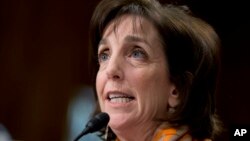The Obama administration has defended its diplomatic opening with Cuba before U.S. lawmakers who are deeply divided on the issue. It remains unclear whether the new, Republican-led Congress will assist or hinder the president’s initiative to normalize relations with Havana.
Congress has been abuzz about Cuba since President Obama’s December announcement restoring official diplomatic ties between Washington and Havana, with congressional delegations jetting to and from the island.
Fully normalizing relations, however, is far from a done deal, as Assistant Secretary of State for Western Hemisphere Affairs Roberta Jacobson told a Senate Foreign Relations subcommittee.
“We have only just begun the official talks on normalizing relations, which will take considerably longer than the first step of the reestablishment of relations, "said Jacobson.
Lawmakers fiercely debate the wisdom of this effort. Cuban-American Senator Robert Menendez, a Democrat, doubts diplomacy and trade will bring change to the island.
“I do not want to relive 50 years of engagement with China that has brought forced abortions, prison camp labor, ethnic cleansing in Tibet, the exile of the Dalai Lama. If that is what we hope for the Cuban people, it is a sad day," said Menendez.
Fellow Cuban-American Marco Rubio, a Republican, says no ties should be restored until the Castro government agrees to democratic reform.
“The Cuban people are the only people in this hemisphere that have not had a free and fair election in the last decade-and-a-half. And the notion that we should be more patient with Cuba than all these other societies is unfair and offensive," said Rubio.
By contrast, Democratic Senator Tim Kaine noted that restoring ties with Havana does not confer an American seal of approval on the Cuban government. Fellow Democrat Barbara Boxer agreed.
“We know this policy is not going to change Cuba overnight, but we have spent the past five decades pursuing a policy that has not worked," said Boxer.
Assistant Secretary of State for Democracy and Human Rights Tomasz Malinowski sought to assure senators that U.S. officials in talks with the Castro government are not blind to realities in Cuba.
“We have no illusions about the current leadership’s desire to keep things just as they are," said Malinowski.
But Malinowski predicted that boosting diplomacy and trade with the island will force the Cuban government to reckon with its failures.
“Every citizen of Cuba knows that the U.S. is willing to have normal relations with their country, and help them connect with the world. These steps have raised the Cuban people’s expectations and shifted the burden for meeting those expectations to the Cuban state," he said.
Ending the longstanding U.S. trade embargo on Cuba would require an act of Congress, something that is viewed as unlikely in the foreseeable future. Of more immediate concern is whether Congress will approve funds to maintain a full U.S. embassy in Havana, if and when relations are normalized.
Senators also heard from prominent Cuban human rights activists. Miriam Leiva, a journalist and wife of the late Cuban dissident Oscar Espinosa Chepe, said the United States has a unique opportunity to push Cuba towards a brighter future, something that can only be accomplished “by being there.”
Rosa Maria Paya, daughter of the late Cuban pro-democracy activist Oswaldo Paya, said, “Engagement will only be real if it occurs between free peoples.”




